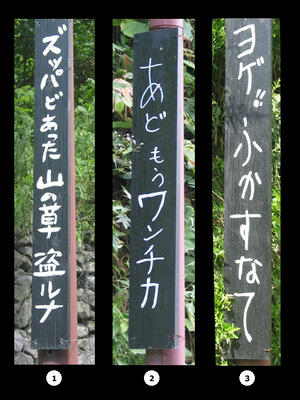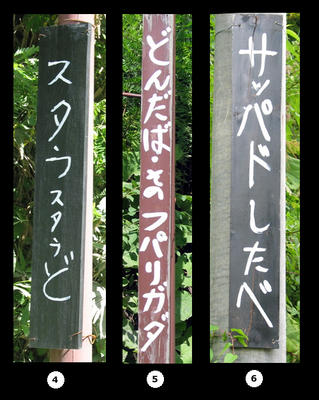Monday, August 29, 2005
Tsugaru Dialect・津軽弁
When I told someone I met at the national orientation in Tokyo that I was going to Aomori, his comment was, 'All those years of studying Japanese wasted.' I looked at him strangely and he elaborated, 'your Japanese is really good, but they don't speak Japanese in Aomori. You won't be able to understand anyone.'
青森に来る前に、東京でJETプログラムの全体のオリエンテーションがありました。そこで会った人 に「青森県に行きます」と僕が言ったら、彼が「もったいないね。せっかく日本語が上手なのにね」と言いました。僕が変な表情をしたから、その次に彼が 「だって、青森では日本語が通用しないぞ。みんなが話していることは君には分からないだろうな」と説明しました。
That was a little bit of an exaggeration, but he wasn't totally wrong. Since coming here I have heard many conversations which I didn't understand. The only explanation that works is people are speaking Tsugaru-ben, of the dialect of this local district.
彼の台詞はちょっと大げさかもしれませんが、完全に間違っているわけではありません。ここに来てから、通じない会話はたくさん聞いています。そして、その説明として、やっぱり、皆さんが津軽弁を喋っているからだと思います。
I personally learn languages by reading. I can hear something 50 times and still not remember it, but if I see it written once or twice, it will stay in my brain. That's why I think learning dialects is so difficult for me. I have lived in Akita for five years but because no one ever writes anything in Akita-ben, I can hardly understand it when my wife talks to her parents.
個人的に、僕は言語を読むことによって覚える人間です。ある言葉を50回 も聞いても、覚えることができませんけれども、同じことを1回か2回を読むと、頭に残ります。それが僕にとって方言が覚えにくい理由だと思います。秋田県 に5年間住んだのに、秋田弁で文書を書く人がいないから、家内が両親とおしゃべりしている時ほとんどは僕に通じません。
Generally speaking, the same is true here in Aomori. Everybody speaks it, but no one ever writes anything down in Tsugaru-ben. Or so I thought. This weekend on the way to an onsen in Kuroishi, I saw many signs by the side of the road. I asked my fluent-in-Akita-ben wife to read them but many she didn't understand.
ここの青森でも同じことです。皆が津軽弁で話しますが、だれも書くことがあり ません。どうやったら学べるでしょうと悩んでいました。しかし、この前の週末、黒石市の温泉に行く途中、津軽弁の看板をたくさん見ました。秋田弁が流暢に使え る家内に意味を聞きましたが、分からなかったものが多かったです。

So we took some photos and will try to interpret them below. The italics is what is written on the sign in Romaji; afterwords is an explanation. Thank you to the staff in my office for their language lesson!
その看板を写真に撮って、以下に説明してみます。斜体がその看板の言葉のローマ字です。その後は説明です。英語は必然的に長くなります。役場内の津軽弁を通訳者してくれた皆さん、ありがとうございました。
① Zuppa do atta Yama no Kusa Toruna
'Zuppa' is local dialect for takusan (meaning a lot); the 'do' is a quotative 'to' with a local twist; atta is the past tense of aru (there is); Yama no Kusa is standard Japanese for mountain vegetation; Toruna too is standard command form meaning 'don't take'.
In total it means, "There were a lot of mountain vegetables, don't steal them."
「ずっぱ」は「たくさん」という意味;「ど」は引用の「と」のなまった形だそうです。
② Ado mou Wanchika
Ado is Ato (after) with the local t sound changing to a d; mou is standard Japanese meaning still; wanchika is Tsugaru-ben for sukoshi (a little).
In total it means, "After Still a Little" or "Just a little further" to the onsen.
「あど」と「あと」という意味;「ワンチカ」は津軽弁での「少し」だそうです。
③ Yoge!! Fukasu na te
Yoge is Tsugaru-ben meaning 'hitsuyou ijou' (more than necessary); Fukasu is local dialect for 'to accelerate'; na, like toruna in ① is a negative command; the final te is an abbreviated quotative 'to itte' roughly meaning 'I said'.
In total it means, "Don't drive faster than necessary!
「ヨゲ」は「必要以上」という意味;「ふかす」は「加速する」という意味です。

④ Sutara Sutara Do
Sutara sutara do is Tsugaru-ben equivalent to 'sassa to' (meaning 'quickly' or 'lightly'); the do is a quotative to.
It sign was probably directing people to not stop and enjoy the scenery too long, because it might cause a traffic accident on the very curvy road.
「スタラスタラど」は標準語で「さっさと」という意味だそうです。
⑤ Dondaba sono Fubarigata
Dondaba doesn't have a good translation in standard Japanese but roughly translates as Oh, my god!; sono is standard Japanese for 'that'; Fubari is a root of 'fubaru', which is a dialect form of 'hipparu', which usually means to pull, but in this case means to drive: gata is a local pronunciation of 'kata', meaning 'way of'.
In total it means, "Oh my god, your driving!"
「どんだば」は標準語にはいい言葉がないですが「オオ、マイゴッド」という意味だそうです。「ふばる」が「引っ張る」から来るそうで、この場合には「運転する」という意味です。
⑥ Sappado shita be
Sappado in standard Japanese would be 'sappari' (meaning 'clean' or 'refreshed'); shita is past tense of 'to do'; 'be' is the ubiquitous northern Tohoku dialect equivalent of standard Japanese's 'deshou' (meaning 'wasn't it').
In total it means, "You were able to be refreshed, weren't you?" (on a sign soon after leaving the hot spring bath).
「さっぱど」は標準語でいうと「さっぱり」という意味です。「べ」は東北どこでも聞く「でしょう」と意味を持つ言葉です。
This was very good practice for me. Hopefully you too learned something!!
僕にとって、これは大変いい勉強になりました。皆さんも勉強になりましたか?
青森に来る前に、東京でJETプログラムの全体のオリエンテーションがありました。そこで会った人 に「青森県に行きます」と僕が言ったら、彼が「もったいないね。せっかく日本語が上手なのにね」と言いました。僕が変な表情をしたから、その次に彼が 「だって、青森では日本語が通用しないぞ。みんなが話していることは君には分からないだろうな」と説明しました。
That was a little bit of an exaggeration, but he wasn't totally wrong. Since coming here I have heard many conversations which I didn't understand. The only explanation that works is people are speaking Tsugaru-ben, of the dialect of this local district.
彼の台詞はちょっと大げさかもしれませんが、完全に間違っているわけではありません。ここに来てから、通じない会話はたくさん聞いています。そして、その説明として、やっぱり、皆さんが津軽弁を喋っているからだと思います。
I personally learn languages by reading. I can hear something 50 times and still not remember it, but if I see it written once or twice, it will stay in my brain. That's why I think learning dialects is so difficult for me. I have lived in Akita for five years but because no one ever writes anything in Akita-ben, I can hardly understand it when my wife talks to her parents.
個人的に、僕は言語を読むことによって覚える人間です。ある言葉を50回 も聞いても、覚えることができませんけれども、同じことを1回か2回を読むと、頭に残ります。それが僕にとって方言が覚えにくい理由だと思います。秋田県 に5年間住んだのに、秋田弁で文書を書く人がいないから、家内が両親とおしゃべりしている時ほとんどは僕に通じません。
Generally speaking, the same is true here in Aomori. Everybody speaks it, but no one ever writes anything down in Tsugaru-ben. Or so I thought. This weekend on the way to an onsen in Kuroishi, I saw many signs by the side of the road. I asked my fluent-in-Akita-ben wife to read them but many she didn't understand.
ここの青森でも同じことです。皆が津軽弁で話しますが、だれも書くことがあり ません。どうやったら学べるでしょうと悩んでいました。しかし、この前の週末、黒石市の温泉に行く途中、津軽弁の看板をたくさん見ました。秋田弁が流暢に使え る家内に意味を聞きましたが、分からなかったものが多かったです。

So we took some photos and will try to interpret them below. The italics is what is written on the sign in Romaji; afterwords is an explanation. Thank you to the staff in my office for their language lesson!
その看板を写真に撮って、以下に説明してみます。斜体がその看板の言葉のローマ字です。その後は説明です。英語は必然的に長くなります。役場内の津軽弁を通訳者してくれた皆さん、ありがとうございました。
① Zuppa do atta Yama no Kusa Toruna
'Zuppa' is local dialect for takusan (meaning a lot); the 'do' is a quotative 'to' with a local twist; atta is the past tense of aru (there is); Yama no Kusa is standard Japanese for mountain vegetation; Toruna too is standard command form meaning 'don't take'.
In total it means, "There were a lot of mountain vegetables, don't steal them."
「ずっぱ」は「たくさん」という意味;「ど」は引用の「と」のなまった形だそうです。
② Ado mou Wanchika
Ado is Ato (after) with the local t sound changing to a d; mou is standard Japanese meaning still; wanchika is Tsugaru-ben for sukoshi (a little).
In total it means, "After Still a Little" or "Just a little further" to the onsen.
「あど」と「あと」という意味;「ワンチカ」は津軽弁での「少し」だそうです。
③ Yoge!! Fukasu na te
Yoge is Tsugaru-ben meaning 'hitsuyou ijou' (more than necessary); Fukasu is local dialect for 'to accelerate'; na, like toruna in ① is a negative command; the final te is an abbreviated quotative 'to itte' roughly meaning 'I said'.
In total it means, "Don't drive faster than necessary!
「ヨゲ」は「必要以上」という意味;「ふかす」は「加速する」という意味です。

④ Sutara Sutara Do
Sutara sutara do is Tsugaru-ben equivalent to 'sassa to' (meaning 'quickly' or 'lightly'); the do is a quotative to.
It sign was probably directing people to not stop and enjoy the scenery too long, because it might cause a traffic accident on the very curvy road.
「スタラスタラど」は標準語で「さっさと」という意味だそうです。
⑤ Dondaba sono Fubarigata
Dondaba doesn't have a good translation in standard Japanese but roughly translates as Oh, my god!; sono is standard Japanese for 'that'; Fubari is a root of 'fubaru', which is a dialect form of 'hipparu', which usually means to pull, but in this case means to drive: gata is a local pronunciation of 'kata', meaning 'way of'.
In total it means, "Oh my god, your driving!"
「どんだば」は標準語にはいい言葉がないですが「オオ、マイゴッド」という意味だそうです。「ふばる」が「引っ張る」から来るそうで、この場合には「運転する」という意味です。
⑥ Sappado shita be
Sappado in standard Japanese would be 'sappari' (meaning 'clean' or 'refreshed'); shita is past tense of 'to do'; 'be' is the ubiquitous northern Tohoku dialect equivalent of standard Japanese's 'deshou' (meaning 'wasn't it').
In total it means, "You were able to be refreshed, weren't you?" (on a sign soon after leaving the hot spring bath).
「さっぱど」は標準語でいうと「さっぱり」という意味です。「べ」は東北どこでも聞く「でしょう」と意味を持つ言葉です。
This was very good practice for me. Hopefully you too learned something!!
僕にとって、これは大変いい勉強になりました。皆さんも勉強になりましたか?
Free Web Counter